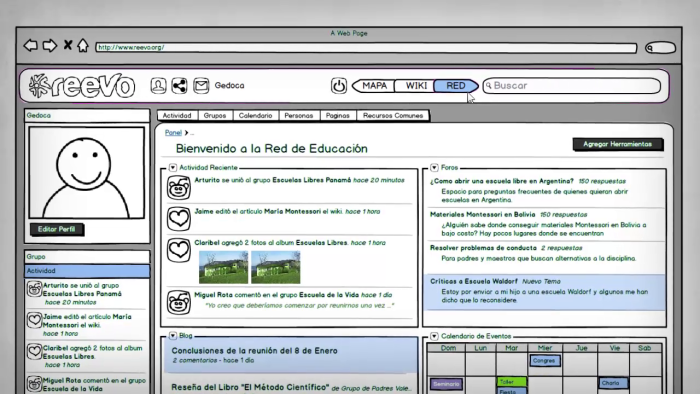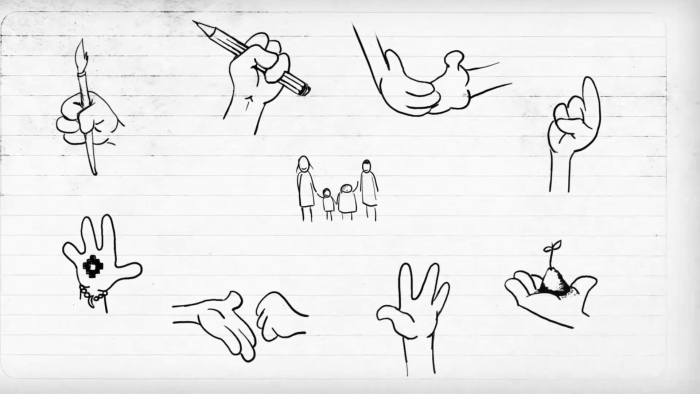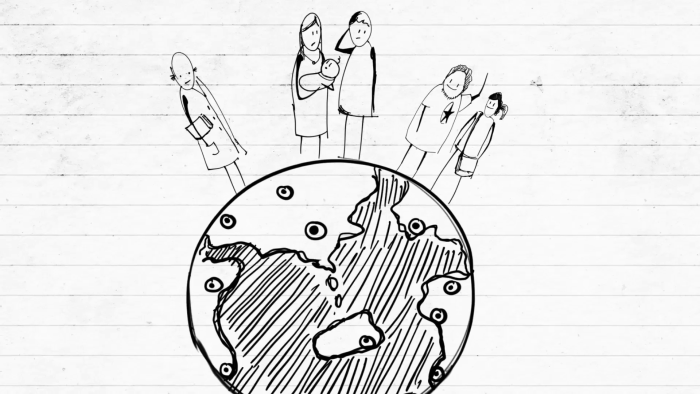Contributing € 10
Acknowledgments
Your name and avatar will be part of the acknowledgments list and Project founders.
> 50 Backers
We use own and third party cookies to improve your user experience and our services, analyzing users' browsing in our website. If you continue browsing, we will consider that you consent to its use. You can get further information in our Cookies Policy
Reevo - Red de Educación Viva
 Min.
Min.
 Opt.
Opt.
 Buenos Aires, Argentina
Buenos Aires, Argentina
Your name and avatar will be part of the acknowledgments list and Project founders.
Your Reevo user profile will be permanent distinguished as a Founder User. As one of us, you will have future benefits + your name and avatar on the acknowledgements.
Pre-view access to the preliminary version of the platform, being able to participate on its development and collaborate actively to upgrade it. Your opinions and assets will be very valued! + Distinguished profile as “Founder User” with future benefits + Your name and avatar on the acknowledgments
A unique limited edition diploma on HQ paper acknowledging you as Founder User, exclusive
Reevo material + Preview Access + Distinguished profile as “Founder User” with future benefits + Your name and avatar on the acknowledgements
You will be able to choose one of the referents who help Reevo to ask him/her everything you want during 2 hs. And learn everything you need to form or transform your educative project or family. We count with the support from free schools teachers, democratic schools, Montessori, Waldorf, experimental, holistic, collage professors, early education specialists, inclusion and homeschooling teachers + T-shirt + Preview Access + Distinguished profile as “Founder User” with future benefits + Your name and avatar on the acknowledgements
Your name or your organization’s will have a special acknowledgment, we will mention your
website and you will be welcomed on the work team meetings in Buenos Aires or online. Your
opinion counts for us and you will be on direct contact with the network coordinator + Experts
consulting + T-shirt + Diploma + Preview Access + Distinguished profile as “Founder User” with
future benefits + Your name and avatar on the acknowledgements
A collaborative plattform to map, document and connect people, experiences, organizations and knowledges related to free learning and non-conventional education models from all over the world.
 Task
Task
|
Minimum | Optimum |
|---|---|---|
|
Platform’s design, programming and practice.
-Design of the user interface
-Ellg tools programming (Lorea distribution) and SemanticMediaWiki for Reevo’s needs
-Use of the 3 Reevo platforms in one integrated system.
|
€ 3.800 | |
|
General Coordination
Two people working full time organizing the project, coordinating the team and the Reevo
institutional relations.
|
€ 800 | |
|
Production of contents
Stable work team dedicated to gather information, document and organize the main concepts;
also investigation projects on educative experiences.
|
€ 2.000 | |
|
Promotion and diffusion
Design of activities and production of promoting material to approach to the educative communities, teachers, students and potential users.
|
€ 600 |
 Infrastructure
Infrastructure
|
Minimum | Optimum |
|---|---|---|
|
Outsourced Services
Fix expenses for servers and dominions for the first year.
|
€ 800 | |
| Total | € 5.400 | € 8.000 |
Reevo is a project to build a website to promote educative initiatives characterized by the respect
to life, human beings and the environment:
It’s a collaborative map and a database of non-conventional education knowledge, experiences,
institutions, resources and referents that outline the transformation of the actual schooling paradigm into a free learning paradigm.
It’s an open source social network where users can share their experiences, find and meet with each other, creating and participating on thematic groups.
It’s a crowdsourcing platform to promote the emerge of new unconventional educative projects.
The project consists on the design, development, launch and maintenance of an online web platform determined by 3 basic elements: [1] a social network, [2] a map and [3] a center of contents.
[1] The social network will setup as a node of Lorea, an free open source distributed social network technology increasingly user around the globe. This social network functionality is primarily thought for user to be able to sign in, discuss and group together. The platform also allows to create calendars, tools for collaborative work and also communication capabilities such as mailing, chats, blogs, etc..
[2] The map will allow to find people, experiences, organizations and resources. The mapping will be done collaboratively by the users and all the collected data will be available under an open database copyleft license.
[3] The so called “Center of Contents” is a wiki, where you could find a diversity of articles with explicative and objective content about the different topics, researches, referents and educative experiences as there exist. As any wiki, it will be editable by it's users. All the contents will be under a "Creative Commons - Attribution - Share Alike 3.0"
In the future we plan to include a crowdsourcing platform for educative projects, which we’ll call “Projects Incubator”.

There are tons of non-conventional educative experiences all around the globe that are invisivilized on education discussions and expelled from public opinion.
There are many organizations that promote and do research about non-conventional education, but there’s no place that collects all that different experiences in an organized way.
The research done for the movie “The Forbidden Education” allowed us to
understand the need of parents and teachers to get more information about non-conventional educative experiences. They need to know and find initiatives and referents on non-conventional education, but they don’t have where to do it.
Collect and provide acces to all the knowledges within the concept we’ve denominated as “live education”, non-conventional educative experiences that pursuits to promote the development of each individual and the construction of different ways of self-driven and truly democratic organizations.
Expand that knowledge base by enabling anyone to update or provide new contents.
Generate a place to engage communication to allow exchanges, meetings and discussions about education and learning.
Promote the generation of new initiatives in this field.

The non-profit NGO "Networks of Peers" it's formed by the group of people who made “The Forbidden Education”. Its action field doesn’t end on the audiovisual communication or in education; its purpose is to encourage actions and projects that search to strength self-organized communities to solve their own needs as a result of their collective action.
“The Forbidden Education” it's a copyleft film released in 2012 which gather en enormous amount of followers, co-producers and fans. The Facebook page has more than 75000 fans, including educators, parents and young people interested on non-conventional educative practices. The movie was financed through crowdfounding and it became the 1st Spanish-speaking movie to be financed and released under this methodology. The film is available under an open license which allows its copy, reuse and remix.
The research conducted for the documentary has given us certain experience in non-
conventional education and a very wide knowledge on diversity of proposals. The project has collected information from a lot of different educative experiences from all around the world, giving the research a wide perspective on non-conventional education.
The film was able to reunite and take ideas and proposals from diverse educative initiatives. It’s very common that participants of a specific non conventional education practice ignores other similar pedagogies. Even though "The Forbidden Education" sets out specifically the need for a new educative paradigm, it clearly refers to the respect of the diversity of proposals and educative experiences. The project does not support or benefit a certain model or educative method, but it encourages the dialogue, reflection and the participating role of the community as a main asset on the proposal. It is an independent project, not only in pedagogic terms, but also politically and economically.
After 6 months of the release, "The Forbidden Education" has been watched in over 30 countries, reproduced more than 6.000.000 times in Youtube, 400.000 downloads and 1000 independent projections. The movie is frequently used in teaching classes, universities, and Spanish speaking teacher formation centers, becoming a referent on the subject.
The team, led by German Doin Campos (http://www.freeingeducation.com), counts with referents on digital common studies, free culture and free software such as Franco Iacomella (http://www.francoiacomella.org) who participates in the project as a consultant. The supportive team is formed by Free Software developers who participate in the Lorea Project; including also wikipedists, designers and usability specialists.




Acknowledgments
Your name and avatar will be part of the acknowledgments list and Project founders.
> 50 Backers
Founder User
Your Reevo user profile will be permanent distinguished as a Founder User. As one of us, you will have future benefits + your name and avatar on the acknowledgements.
> 76 Backers
Super-User
Pre-view access to the preliminary version of the platform, being able to participate on its development and collaborate actively to upgrade it. Your opinions and assets will be very valued! + Distinguished profile as “Founder User” with future benefits + Your name and avatar on the acknowledgments
> 20 Backers
Diploma
A unique limited edition diploma on HQ paper acknowledging you as Founder User, exclusive
Reevo material + Preview Access + Distinguished profile as “Founder User” with future benefits + Your name and avatar on the acknowledgements
> 08 Backers
Experts Consulting
You will be able to choose one of the referents who help Reevo to ask him/her everything you want during 2 hs. And learn everything you need to form or transform your educative project or family. We count with the support from free schools teachers, democratic schools, Montessori, Waldorf, experimental, holistic, collage professors, early education specialists, inclusion and homeschooling teachers + T-shirt + Preview Access + Distinguished profile as “Founder User” with future benefits + Your name and avatar on the acknowledgements
> 02 Backers
Patron
Your name or your organization’s will have a special acknowledgment, we will mention your
website and you will be welcomed on the work team meetings in Buenos Aires or online. Your
opinion counts for us and you will be on direct contact with the network coordinator + Experts
consulting + T-shirt + Diploma + Preview Access + Distinguished profile as “Founder User” with
future benefits + Your name and avatar on the acknowledgements
> 01 Backers
Help gathering information, creating or editing articles of the Reevo Centre of Contents.
We invite you to visit schools and innovative experiences with very little or even no information available, to document it and make them known.
Cooperate bringing publications, books or documents about non-conventional education with low availability.
Reevo will be Free Software. If you have knowledge on MediaWiki, Elgg, Lorea and/or PHP+HXTML+JavaScript programming, you can join the developers comm